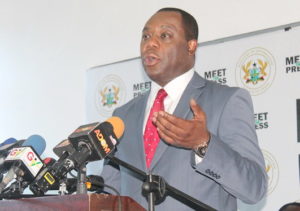
Accra, Ghana, May 26, 2019//-The earliest history of formal, western-style education in Ghana is directly associated with the history of European activities on the Gold Coast.
The Portuguese were the first Europeans to arrive at the Guinea coast in 1471.
Their intention to establish schools was expressed in imperial instructions that, in 1529, encouraged the Governor of the Portuguese Castle at Elmina to teach reading, writing, and the Catholic religion to the people
Over the centuries education has had different goals, from spreading the Gospel to creating an elite group to run the colony. After Ghana gained its independence in 1957 the education system, then modeled on the British system, has undergone a series of reforms.
Unmistakably linked to the implementation of formal education in Ghana were the Christian Missionaries, who realised that in order to spread the word of God they needed well-educated local assistants.
The missionaries played an important role in establishing an education network in Ghana. For instance, representatives of the Basel Mission Society of Switzerland were able to convince the Chiefs of Ghana in 1832 to send their children to the Government School at Osu.
Besides reading, writing and arithmetic, workshops were organised for students to acquire practical skills. Carpentry, masonry, blacksmithing, shoemaking and sewing for girls were taught, as well as practical agriculture and medical and health education.
One of the greatest achievements of the Basel Mission Society was the transcription of local languages (Twi, Ewe and Ga languages) to facilitate education and the spreading of the Gospel.
By 1894, 62 years after their arrival in Ghana, they had established a Training College, 3 grammar schools, seven boarding schools for boys and girls and 98-day schools.
By 1874 when the British Government assumed colonial authority of the Gold Coast colony, significant progress had been made in the educational sector and it was still expanding with the majority of the Basel and Wesleyan Mission schools scattered widely over the interior. Most of the teaching was done in the vernacular languages.
By 1881 there were 139 schools. Of these, one in Cape Coast and two in Accra were under direct government management. The Basel Mission had 47 schools, the Wesleyans 84, the Bremen Mission 4 and the Roman Catholic Church, one.
However, it was observed that the system of education adopted by the various missions differed widely, and so in 1882, the Government drew the first plans to guide the development of education.
For education to be relevant there is the need for proper curriculum. A curriculum according to educationists is an important factor in an educational system since It helps in planning the education process or procedure for a given period of time, term, season, lesson and period.
The reforms in the 1980s geared the education system away from purely academic to more in tune with the nations manpower needs.
The present structure of education, which starts at about age of 6 years, consists of 6 years of primary education, 3 years of Junior Secondary School, 3 years of Senior Secondary School and 4 years University or courses at other tertiary institutions
In line with agitations for more reforms on the country’s education system, Professor Kwasi Opoku-Amankwa, Director-General of the Ghana Education Service, launched a New Basic Curriculum as part of ongoing reforms in the sector on April 11, 2019.
His explanation was that the Education Ministry was embarking on the reforms, particularly at the pre-tertiary level, to make education more responsive to the human resource and development needs of the country.
According to Prof Osei Kwarteng, Chairman of the National Council for Curriculum and Assessment (NaCCA), the new changes fall in line with the Africa Union (AU) guidelines for all African countries to include lessons of African history and culture in their syllabus by 2065.
He disclosed that though the United Nations (UN) Sustainable Development Goals (SDGs) call for the renewal of school curricula every 10 years the country has failed to do that in the past decade, hence the new reforms.
Key features of the reforms which take effect at the start of the new academic calendar in September are: at KG, the number of learning areas is to be reduced from seven (7) to four (4) which are integrated into themes.
However, these will be treated with more depth; at Lower and Upper Primary, the number of subjects remains the same. However, there will be fewer concepts and more in-depth treatment of concept in each subject.
Further, there is greater emphasis on literacy and numeracy; introduction of standards-based curriculum. This means that at every stage in school, a student is expected to demonstrate an understanding and mastery of knowledge and skills that they are expected to learn as they progress through their education; while there will be national assessments at P2, P4 and P6 to ensure that children’s performance is being tracked.
Other features are: history of Ghana will be compulsory for each child from P1 to P6; RME will be a standalone subject; PE will be a standalone subject and will be taught practically; and French introduced at Upper Primary
As Ghanaians wait for the beginning of the calendar year in September, 2019, the question people are asking is: “Is the new reforms the end of all the inadequacies in the country’s educational system?”
By Oppong Baah, African Eye Report


